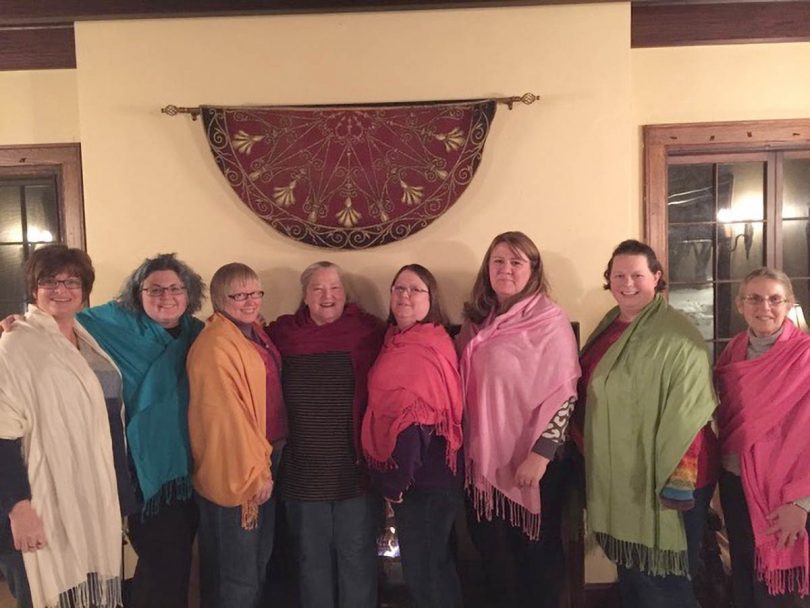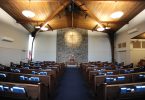On a cold January day, seven Moravian clergy made their way over snow-covered roads to central Wisconsin’s Green Lake Conference Center. There, they began a six-month journey to explore God’s call to justice for each of us, and for the church we love, through Auburn Seminary’s Justice Ministry Education (JME) Program.
Led by the Rev. Canon Peg Chemberlin, we learned about the structure of the on-line class we were beginning, and were challenged to name where we wanted to be at the end of it. “What is mine to do?” I had no clue.
At times I wondered why I was there. I only knew that our scriptures had frequently called out to me to work for justice—God’s vision for humanity in creating all in God’s image, equal in God’s sight; God’s intention is for shalom—for the well-being, wholeness, abundance and peace of all of creation; the prophetic challenges of the Israelites to “let justice roll down like waters” (Amos 5:24) and “to do justice, and to love kindness, and to walk humbly with your God.” (Micah 6:8)
Jesus’ own “job description” in Luke 4:18 was to bring good news to the poor, release to the captives, recovery of sight to the blind, to let the oppressed go free, and to proclaim the year of the Lord’s favor—referencing the year of Jubilee for the Israelites which promoted a grand scheme of economic leveling by restoring land and releasing debt.
I sat there thinking of the growing economic divide in our world today between the rich and the poor, the depth of racism in our country and the increasing national fervor throughout the world to put self over other. I considered my own efforts over the years to address the poverty that we see for many of our global partners with the goal of helping them find ways to improve their sources of income and decrease dependency. There was some success in these efforts, but so much more to do.
And although our church is passionate about helping those in need, I recognized the reticence to “go upstream” to challenge the systems that keep people captive today and limit their ability to achieve the abundance that God desires for them. How do we begin to have a voice for those who are oppressed in our society? I had no answers. But I knew that I had to try to find some.
We’ve come a long way in six months. After that initial retreat we met twice a month using Zoom, a videoconferencing system. My cohort partners were Trina Holmberg, Marian Boyle Rohloff, Cynthia Rader Geyer, Sue Koenig, Laura Gordon, and Suzanne Miller, representing both provinces and all three Northern Province districts. Each brought different gifts to the group and over the six months together, God’s call on our hearts was evidenced in distinct passions around the issues of homelessness, prison reform, racism, youth development, immigration, education equity, and the spiritual foundations of our work.
With challenging readings and excellent speakers, we delved deeply into the theological underpinnings of justice, the realities of injustice in our society, and were reminded how situations of injustice that we see today intersect with each other. We learned about strategies for promoting change and set our own goals and work plans by which to move toward them. Here are some observations from the cohort around what they have gained from this experience:
“What a blessing it has been to walk alongside my justice sisters as together we deepened our understanding of the call to justice through the lens of our Christian faith! I have also learned the language of justice through introduction to various works and amazing justice workers who graciously shared their time and insights with our cohort. This has helped me to gain greater clarity about my own call to justice work and to better articulate this call and the theological grounding in which it is rooted. This process has also helped me to see my blind spots and challenged me to tend to those areas within my own being that stand in the way of the call to justice in our world. I highly recommend this program to anyone interested in exploring further the call to seek justice.”
Laura A. Gordon
“The JME Program has been invaluable to me and to my ministry. I have learned much, and I am excited to continue to reflect and draw on my experience as I pursue justice ministry in my church and community. All of the components of the JME program are well-integrated and gave me opportunities to do hands-on, in-depth justice work in a selected context and in a variety of justice movements; to develop extensive skills and strategies for justice work that will lead to transformative change; to build relationships and coalitions for collaboration on justice ministry; and to gain a clearer understanding and confirmation of my call to justice ministry…I now have a strong and well-articulated theological and biblical basis for justice ministry and the ability to lead congregations in justice work that will transform lives, communities, the nation, and the world.”
Sue Koenig
“The JME Class has given me a broad, intersectional view of justice while allowing me to focus on the issue closest to my heart. Combining the organizing and vision steps required for education justice work with theological grounding to do it from a faith perspective leaves me with a plan for action on behalf of all of God’s children to ensure each of them has access to a valuable, enriching public education. It also gives me a cohort of justice advocates who provide strength and support for this journey!”
Suzanne Miller
In reflecting on her participation, Marian Boyle Rohloff shared a quote from the Rev. Dr. Martin Luther King, Jr.:
“On the one hand, we are called to play the Good Samaritan on life’s roadside, but that will be only an initial act. One day we must come to see that the whole Jericho Road must be transformed so that men and women will not be constantly beaten and robbed as they make their journey on life’s highway.”
Justice incorporates more than going upstream. In an interview with Peter K. Greer, Christian activist Shane Claiborne commented:
“And one of the things that Dr. [John M.] Perkins says when there’s all kinds of elements that we combat, the poverty and social ills of our world. ‘You know you’ve heard the old saying, “You give a person a fish and you feed him for a day; but if you teach him to fish and you feed him for a lifetime.” He says, ‘We’ve also got to ask, “Who owns the pond? And who polluted the pond? And who built the gates up… and why does a fishing license cost so stinkin’ much?”’ I know a lot of people that have a fishing rod, and they can’t get to the pond.”
Where does the Moravian Church see God calling us to address the issues of justice that imprison people today? Our justice cohort is available as a resource to individuals and congregations wishing to grow in this area. Also consider participating in the next justice class, or seeking out other learning opportunities.
I am convinced that the church carries a vital role to claim and live out the gospel values that Jesus taught us that include challenging the systems that limit the ability of people to provide for their basic needs and to grow into the fullness of all that God desires for them. We need to continue the wonderful charity that we provide, but move beyond charity to address the issues of justice that we see in every aspect of our society. I encourage each of us to explore the question posed to our class—“What is mine to do?”
The Rev. Judy Ganz is a retired Moravian pastor and former executive director of the Moravian Board of World Mission of North America.



